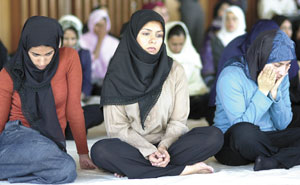|
HOME | SEARCH | ARCHIVE |
|
Special
Issue: Muslims Bring Peace, Prayer to Campus
People of All Faiths Come Togetherfor Weekly ‘Jumaa’
![]()
by Diane Ainsworth
| |  Muslim students participate in a prayer breakfast in the student union. They were joined by 1,000 fellow students of all faiths, who came to learn about Islam. Sean Boyd photo |
20 September 2001
|
More than 1,000 students, many with no first-hand knowledge of Islam and its rituals of devotion, gathered with Muslim students on Friday for a mid-day Islamic prayer session. Amid the still palpable shock and confusion of Tuesday’s attacks on the World Trade Center and the Pentagon, the campus’s Muslim Student Association hosted the session in Pauley Ballroom in the Martin Luther King Jr. Student Union, to pray and to educate. Basin Elkarra, president of the association and a senior political science major, led the hour-long campus “jumaa” (Friday prayer), which is usually held in various places of Muslim worship in the Berkeley community. “We wanted to hold this on campus to encourage students to come talk to us about the terrorist attack and the links that were being made in the media to the Islamic community,” Elkarra said. “This campus is just an amazing place of tolerance. ASUC and the administration were very supportive of our efforts.” Muslim and Arab organizations on university campuses across the nation rushed to issue condemnations of terrorism and hate-motivated violence last week, as news emerged day by day of the terrorists and their possible links to Osama bin Laden, the wealthy anti-U.S. Islamic fundamentalist. Muslims on campus went to great lengths to explain that terrorists who happen to be Muslim do not represent Islam or Muslims at large. These statements notwithstanding, extra security guards from the UCPD were on hand to watch over Friday’s early afternoon worship. “It’s just precautionary,” said Syed Abdullah Bukhari, a freshman who plans to pursue pre-med. “On the whole, this is such an accepting environment, we didn’t anticipate trouble.” “I feel grief and shock at what has happened, but ASUC has handled everything very well,” said Zeest Kahn, a fifth-year senior majoring in molecular biology. “The campus was committed to dealing with the grief and answering questions in solidarity with us.” Inside the ballroom, chairs faced the podium, but the front rows had been removed and the floor covered with mats for men wishing to pray during the worship hour. About 100 young men, with shoes off, sat on floor mats. Young women, veiled and also shoeless, sat side-by-side on mats behind them. Chancellor Robert Berdahl offered his condolences to those who had lost family and friends in the attack. “We’re here to pray … for those who were killed in those terrible acts of violence in New York City, Washington, D.C. and Pennsylvania, and to pray for their loved ones, whose lives have been terribly and forever changed by these events. We pray that the people who are charged with leadership be moved by wisdom and justice, and not by anger.” Hatem Baziam, a Berkeley lecturer and director of the Al-Qalam Institute for Middle Eastern Studies, gave a special sermon, urging the audience to question news reports and all of the associations being made publicly between the Muslim world and the alleged terrorists. “These acts were horrendous, in every sense of the word,” he said. “They do not represent the Islamic faith or Muslims in general.” Witnessing 5,000 people dying “is a major emotional event, and people need to be with this emotion,” he said. “We need (time) to process it, but we need to find the commonalities in people, and the virtues, and not (allow ourselves) to fall into despair.” “As a community, we need to support each other,” added ASUC President Wally Adeymo, who helped stage the Muslim worship sevice on campus. “We hope that events like this will never happen again, but I hope that we come together as a community and help each other mourn our losses.”
Home | Search | Archive | About | Contact | More News
Copyright 2000, The Regents of the University of California.
Produced and maintained by the Office of Public Affairs at UC Berkeley.
Comments? E-mail berkeleyan@pa.urel.berkeley.edu.